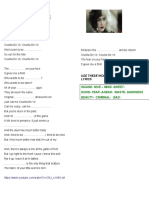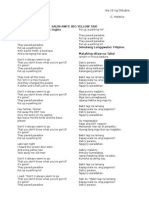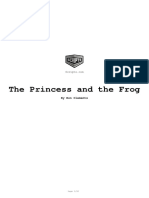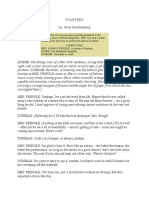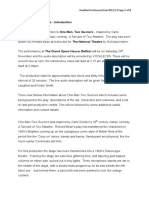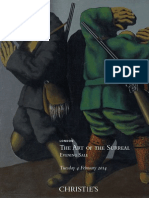Mousetrap Study Guide
Mousetrap Study Guide
Uploaded by
summerjenaraCopyright:
Available Formats
Mousetrap Study Guide
Mousetrap Study Guide
Uploaded by
summerjenaraOriginal Description:
Copyright
Available Formats
Share this document
Did you find this document useful?
Is this content inappropriate?
Copyright:
Available Formats
Mousetrap Study Guide
Mousetrap Study Guide
Uploaded by
summerjenaraCopyright:
Available Formats
2
2
Table of Contents
Credits Page 3
Who is Vertigo Theatre 4
Theatre etiquette 5
Before the Play activities and preparation 6
After the Play activities and further study 10
Sponsor information 13
Teacher evaluation form 14
3
3
THE MOUSETRAP
By Dame Agatha Christie
Cast
Adrienne Smook Mollie Ralston
Stafford Perry Giles Ralson
Christian Goutsis Christopher Wren
Valerie Planche Mrs. Boyle
Brian Smith Major Metcalf
Jamie Konchak Miss Casewell
Doug McKeag Mr. Paravicini
Tyrell Crews Sgt. Trotter
Creative Team
Simon Mallet t Director
Terry Middleton Set Design
Dave Smith Lighting Design
Mike Gesy Sound Design
Deitra Kayln Costume Design
Kelly Lunn Stage Manager
Heather Rycraft Assistant Stage Manager
Nichole Bergen Apprentice Stage Manager
Terri Gillis Production & Facility Manager
Becky Solly Technical Director
Venetian Interiors Set Construction
Jennifer Hedge Head Scenic Painter
Amanda Fox Head of Props
Carolyn Devins Wardrobe
Tyne Fox Production Assistant
Adam Schrader House Technician
Study Guide written by Abby Charchun, Educational Consultant.
Additional material by Laura Facciponti & Arthea JS Reed, PhD from A Teacher!s
Guide to the Signet Edition of Agatha Christies! THE MOUSETRAP and Other
Plays
For Vertigo Theatre
Suzanne Mott General Manager
Mark Bellamy Artistic Director
Nathan Pronyshyn Y Stage Producer
4
4
Vertigo Theatre operates out of Vertigo Theatre Centre and is located in the heart
of downtown at the Calgary Tower.
Housing two performing spaces, The Playhouse and The Studio, Vertigo Theatre
produces a mystery series (Vertigo Mystery Theatre) and presents theatre-for-
young-audience productions from across the country (Y Stage).
Vertigo Mystery Theatre is a unique opportunity for students to come together
and engage in an entertaining theatrical experience that promotes problem
solving. Appropriate for Junior and Senior High School students, Vertigo Mystery
Theatre allows students to study the literature of authors such as Agatha Christie
and J.B. Priestly while engaging in a shared cultural experience.
Y Stage provides young audiences and adults alike an opportunity to investigate
and rediscover our world. Y Stage is ideal for educating young people on the vast
scope of theatre as we feature a wide variety of performance styles including
physical theatre, mask, dance and spoken word. With five productions and an
additional show aimed specifically at teens, Y Stage truly has something for
students of all ages.
5
5
Theatre Etiquette
Unlike a movie, the actors are live on stage, and can hear the audience when
they talk or and text message. They can see the light from your phone as you
check your messages, or see you sleeping. These distracting activities can
greatly affect one of the most wonderful parts of live theatre: the communication
and connection between the actors and you. There is an energy that is passed
between the two, and good audiences can make help make it a great show
because the actors know that you are listening and engaged in the performance.
A few behavioral guidelines are as follows:
The performers, crew and administrative staff are all professionals working to
provide an exceptional theatre-going experience. Please encourage your
students to assist our efforts by abiding by school and theatre guidelines at all
times. Please know that we will expect your students to comply with our
standards when they are in our facility.
We encourage students to fully engage in the performance by reacting to the
events on stage in an appropriate manner. Definitely laugh when something is
funny, and definitely applaud at the end. One of the most exciting things about a
student matinee is its vibrant energy and spontaneity.
Tips for Theatre Trips
* Stay with your group at all times and pay attention to your teachers and
chaperones.
* Make yourself comfortable while keeping movement to a minimum.
* Please do not stand up, walk around or put your feet on the seat or stage in
front of you.
* Absolutely no chewing gum, eating or drinking in the building.
* No backpacks, cameras, or electronic devices are permitted in the theatre.
* Feel free to talk quietly before the show.
* The performance begins when the lights dim to a blackout and the music starts
to play.
* Laugh if you see something funny, but absolutely no talking or whispering
during the show.
* Show your appreciation by clapping at the end of the play. The actors love to
hear applause!
* Don!t leave your seats until after the lights have come back up.
* Wait for the ushers to escort your group out of the theatre.
6
6
Before the Play
History of the play
THE MOUSETRAP was initially performed as a radio play in 1952 and was
broadcast by the BBC with the title Three Blind Mice. The forty-five minute play
proved so popular that Christie went back to work on the script, expanding it to a
full-length theatrical play. The play opened in London at The Ambassadors
Theatre on November 25, 1952. The play later transferred to St. Martin's Theatre
in London on March 23, 1974 and has been running there ever since.
THE MOUSETRAP has broken several records for its continuous theatrical run
since its opening, and millions of people have attending the show. Performances
of THE MOUSETRAP continue to benefit from tourists who seek out the play
both for its artistic merits and for the joy of being part of a theatrical tradition.
Christie signed over the royalties from the play to her grandson, Matthew
Pritchard, at its opening in 1952. Pritchard visited Calgary in 2003 to attend the
world premiere of the lost Agatha Christie play CHIMNEYS at Vertigo Mystery
Theatre.
Synopsis of the play
Mollie and Giles Ralston are opening their guesthouse, Monkswell Manor, for its
first guests. They are new to the business and struggle with the details and an
unusually heavy snowstorm. They hear on the radio that a Mrs. Maureen Lyon
has been murdered in London and the suspect is wearing a dark overcoat, light
scarf, and soft felt hat. Giles is wearing similar outerwear, as are many of the
guests. After all the guests have settled in, Mollie receives a phone call from the
police station. She is informed that Sergeant Trotter will be coming to the Manor
and everyone must fully cooperate with him.
The Sergeant arrives on skis, informing everyone that a notebook was found at
the London crime scene, listing the address at which the murder occurred and
also that of Monkswell Manor, implying that the guesthouse could be the site of a
second murder. Soon after his arrival, the phone lines go dead and all are
stranded at the guesthouse in the snowstorm.
Sergeant Trotter informs the group that the rhyme Three Blind Mice was written
below the addresses, and a picture of three little mice and a bar of music were
found on the dead woman!s body. Further, the murdered woman was the wife of
a farmer named Stanning. They resided on Longridge Farm, not far from
Monkswell Manor. The Stannings allegedly neglected and abused children who
were in their care. One child died; his two siblings survived. The Stannings were
sentenced to prison. Mr. Stanning died in prison, but Mrs. Stanning served her
time, was released, and later changed her name. She was the Maureen Lyon
who was murdered and found dead in London.
7
7
Sergeant Trotter theorizes that the killer is one of the children, most probably
the boy since he later served in the army and was diagnosed a schizophrenic.
The Sergeant informs the group that any of them could be the next victim. He
interrogates them to see if they have any connection with the Stannings or the
abused children. All deny any connections, but Mollie later points out that Mrs.
Doyle was the magistrate responsible for sending the three children to Longridge
Farm. Later that night while the residents are settled throughout the manor, Mrs.
Doyle is found strangled.
For the remainder of the play, the residents of the Manor, including Mollie and
Giles, suspect each other. Accusatory clues draw attention to characters acting
suspiciously. Sergeant Trotter asks the residents to reconstruct Mrs. Boyle!s
murder, acting out the actions of each guest while switching roles so as to test
the accuracy of their memories. The Sergeant plays Mrs. Boyle. When everyone
is in position, he calls for Mollie to come into the parlor. It is then that Trotter
reveals that he is Georgie, the surviving boy who was abused by the Stannings.
Further, he claims that Mollie was his teacher and that he had sent her a note
asking for help, which she ignored. Mollie confesses that she was his teacher,
but was sick when the note was sent and did not receive it until after the children
had left the Stanning!s care. She has lived with the guilt ever since. Georgie
attempts to strangle Mollie, but is thwarted by Miss Casewell and Major Metcalf.
Miss Casewell confesses that she is Katherine, Georgie!s grown sister. She
calmly coaxes Georgie upstairs and gives him a sedative to calm him until
the police arrive. Major Metcalf reveals that he is an undercover policeman who
has played the role of a guest. He had suspected Trotter all along, but needed
proof. The play ends with Mollie and Giles exchanging anniversary presents as
the work of their guesthouse continues.
Biography of the playwright
Agatha Christie is the best-selling author of all time. She has sold over two billion
books worldwide and has been translated into over 45 languages. In a writing
career that spanned more than half a century, Agatha Christie wrote eighty
novels and short story collections. She also wrote over a dozen plays, including
The Mousetrap, which is now the longest running play in theatrical history.
Christie's first novel, The Mysterious Affair at Styles, was the first to feature her
eccentric Belgian detective Hercule Poirot. One of the most famous fictional
creations of all time, Poirot's 'little grey cells' triumphed over some of the most
devious criminal minds ever created in crime fiction. Christie!s last published
novel, Sleeping Murder, featured her other world-famous sleuth, the shrewdly
inquisitive Miss Jane Marple of St. Mary Mead. Miss Marple appears in twelve
novels, and twenty short stories; the first novel to feature her was The Murder at
the Vicarage in 1930. The Poirot and Marple novels have been widely
dramatized in feature films and television movies. Murder on the Orient Express
(1974), Witness for the Prosecution (1957), And Then There Were None (1945),
and Death on the Nile (1978) are a few of the successful films based on her
works.
8
8
Agatha Christie has become synonymous throughout the world with England.
Her quintessential English characters offer a charming view of a bygone era
when people sat down to tea in the afternoon, tended roses in their gardens and
where village life provided all the scandal one could ever want to hear!
The richness of the settings in Christie!s novels add to the great enjoyment when
reading her novels and she drew on real places when writing her stories. Many
are set in Devon where she grew up; Burgh Island, just off the coast is said to be
the setting for And Then There Were None and Evil Under the Sun. Her beloved
Greenway was to provide the basis for Dead Man!s Folly, Ordeal by Innocence
and Five Little Pigs.
Agatha Christie also wrote six romantic novels under the pseudonym Mary
Westmacott. She also wrote non-fiction; one book Come Tell Me How You Live,
describes her archeological travels with her husband Max and the other two are
collections of poems, stories and verses, some with a religious theme. She also
wrote her autobiography, which she completed in 1976. Although synonymous
with crime fiction, the breadth of themes in her novels is quite extraordinary and
she deserves her place as one of the best-loved writers of all time.
(from www.agathachristie.com)
Preshow Discussion topics and activities
Themes: Group Dynamic
Instinct
Circle of Expectations
Trust
Suspicion
Experiencing the Witness Perspective
Set up a witness game by preplanning for a stranger to enter the classroom that
dresses and acts out of the ordinary. Perhaps the stranger could be lost and
asking for directions, confronting you with a private issue or trying to take
something out of the classroom. Have the stranger dress in easily identifiable
colors and accessories, carrying a number of props. Then after the stranger has
left, ask the students specific questions about what the stranger was wearing,
saying, carrying, doing, and the direction he/she was headed. Students learn how
descriptions vary from one person to the next. Which students are able to provide
the most accurate description? How? Why?
Using Mysteries to Encourage High Levels of Thinking
Using Benjamin!s Bloom!s cognitive taxonomy as a guideline, below are some
ways to move students to higher levels of thinking during the reading of any of
Agatha Christie!s plays.
KnowledgeHave students arrange the characters and events in the mystery in
order.
9
9
ComprehensionHave students classify events, describe characters, and
explain precisely what has occurred.
ApplicationStudents can apply existing knowledge to the mystery by
illustrating, dramatizing, and writing their interpretations.
AnalysisHave students analyze, categorize, and differentiate characters and
events.
SynthesisStudents can collect and organize facts to form hypotheses. They
can attempt to solve the mystery, using evidence presented during the play.
EvaluationHave students appraise, argue, assess, and evaluate their opinions
in the process of solving the mystery.
10
10
After the Play
Post-show Discussion topics and activities
The Nightmare: Being Suspicious of Everyone
In Act Two, Mollie is distraught by all the suspicious clues that are making her
question even her own husband!s integrity. She describes her feelings in the
following passage, That!s what happens in a nightmare. You!re somewhere in
the middle of friends and then you suddenly look at their faces and they!re not
your friends any longerthey!re different people just pretending. Perhaps you
can!t trust anybodyperhaps everybody!s a stranger.
Draw a diagram of how the nightmare developed in THE MOUSETRAP. Is the
audience affected by the nightmare as the characters are? How does Christie
plant doubt and suspicion in the minds of the characters, through actions rather
than words, so that those seeing him or her are suspicious?
The Longest Continuously Running Play in History
THE MOUSETRAP has been running continuously in London!s Ambassadors
Theatre since 1952.
Ask if any of the students have seen the play.
What has kept this play popular for so long?
What elements draw audiences year after year?
What would make you want to see the play?
Does reading it make the prospect of seeing it more or less appealing? Why?
Research reviews about the play and determine what contributes to its long-
running success. Note that in London, the actors change every few years. How
would changing the actors help keep the play alive and entertaining?
Disguises and Double Identities
Several of the characters have double identities, worn like actors! masks. Have
students discuss each character!s double identity and how he or she wears the
mask throughout the play, occasionally dropping it to reveal her or his true
identity in words in actions. Some characters to consider are Trotter, Mollie,
Paravicini, Miss Cantwell, and Major Metcalf.
Students can compose letters or stories that reveal the characters true identities.
For example, Mollie could pen a letter of apology to Georgie. Or, they can create
two masks for each character, each revealing another element of her or his
identity.
Nursery Rhyme as Plot
Read the nursery rhyme Three Blind Mice and discuss how it provides the
structure for the play!s plot.
Have students locate other common nursery rhymes, folk tales or famous stories
used to provide the structure of popular movies or TV dramas. Examples include
Romeo and Juliet and West Side Story. Bring to class a book on children!s
11
11
literature and read about how nursery rhymes are constructed. Discuss why
they provide a good plot structure for other types of literature, particularly drama.
Selecting a Title
THE MOUSETRAP is based on the nursery rhyme Three Blind Mice. Although
Christie!s original radio play shared the title of the rhyme, it was changed when
Peter Saunders, Christie!s longtime director and friend, remembered another
moderately successful play of the same title. Is the name THE MOUSETRAP
appropriate for the play? Why? What else might it have been titled?
Play Critique
Guidelines for writing a play review:
The review should be relatively short with opinions delivered in a clear, concise
manner.
The factual material must be correct. Check all facts pertaining to the writer and
the literature.
The review should be firm and assertive, not wishy-washy. A reviewer must
have a strong opinion.
The reviewer is entitled to whatever opinion he or she has of the work be it
positive or negative, but the opinion must be substantiated with details and
examples.
The reviewer should establish a voice, tone, and personal style that make the
review interesting.
Writing a Review Checklist
Does the review state the author!s name and work(s)?
Does the review include the name of the theatre company and names of relevant
actors/directors etc.?
Does the review give a clear and powerful statement of the writer!s opinion of the
work?
Is the review geared towards a particular audience?
Does the review summarize the important points of the work?
Is quoted and/or paraphrased material included to support the points and
reactions toward the work?
Does the review include, if appropriate, comparisons and connections with other
similar works?
12
12
Is factual information included? Have facts been checked carefully for
accuracy?
Does the review!s style establish and communicate the reviewer!s voice?
If necessary, does the review incorporate a rating system with a key that explains
the ranking?
Does the review leave the reader with a sense of whether he/she will want to see
the production?
Has the review been carefully proofread? Have all errors in spelling, grammar,
and mechanics been corrected?
Student Reflection Sheet
What!s the best line in your review? Why?
What!s one thing you would like to do to improve the piece, if only you knew how
to do it?
In writing this review, what did you discover about your opinion that you didn!t
realize before?
After reading your review, what question(s) might a reader still have?
What do you think is the one thing a reader is most apt to take away from your
review?
How would you rate yourself as a reviewer? In other words, is this your genre,
or do you prefer other kinds of writing? Why?
13
13
Sponsor information
14
14
Evaluation Form
Your Feedback is very important to us! Our series are growing rapidly and the
information you provide will help us to determine future programming, booking
procedures and educational content. Return by fax to 403-263-1611
SHOW: SCHOOL:
TEACHER NAME: GRADE:
Please rate the following from 1-10 (1=Poor, 5=Good, 10=Excellent)
1) Booking Procedure
(poor) 1 2 3 4 5 6 7 8 9 10 (excellent)
Comments:
2) Affordability & Accessibility (Price, Bussing, etc)
Comments:
4) Show Start Times & Performance Duration
1 2 3 4 5 6 7 8 9 10
Comments:
5) Study Guide Material
1 2 3 4 5 6 7 8 9 10
Comments:
6) Production Value (Set, Costume, Props etc.)
1 2 3 4 5 6 7 8 9 10
Comments:
7) Educational Value: (Was the production successful as a learning experience
for your students?)
1 2 3 4 5 6 7 8 9 10
Comments:
8) Entertainment Value (Did the production engage your Students?)
1 2 3 4 5 6 7 8 9 10
Comments:
9) Overall Experience
1 2 3 4 5 6 7 8 9 10
Comments:
General Feedback and suggestions:
Thank you for helping us continue to improve our series!
You might also like
- Characters of Radium GirlsDocument1 pageCharacters of Radium GirlsBrandon KruhmNo ratings yet
- When Mel Fell For Nell Monologue:: Scene 10Document1 pageWhen Mel Fell For Nell Monologue:: Scene 10Lottie VictoriaNo ratings yet
- Christmas TV Show ScriptDocument10 pagesChristmas TV Show Scriptapi-690596217No ratings yet
- The 1914 Christmas Truce ScriptDocument12 pagesThe 1914 Christmas Truce Scriptcaren santosNo ratings yet
- John, Paul, George & Ben - Lane SmithDocument14 pagesJohn, Paul, George & Ben - Lane SmithSuzann Hughes0% (1)
- Diary of Adam and Eve MonologueDocument1 pageDiary of Adam and Eve MonologueTess D100% (1)
- LamdaDocument4 pagesLamdaUshani CabralNo ratings yet
- Audition Notice Wizard of OzDocument3 pagesAudition Notice Wizard of OzTJerome BakerNo ratings yet
- Snow White ScriptDocument13 pagesSnow White ScriptIsabelle SmithNo ratings yet
- Tuaua V US, Cert Petition & AppendixDocument107 pagesTuaua V US, Cert Petition & AppendixEquallyAmerican100% (1)
- Parent Orientation Guidance For YTADocument5 pagesParent Orientation Guidance For YTAJerameel FelicianoNo ratings yet
- Introduction To Theatre NotesDocument26 pagesIntroduction To Theatre Noteshgfree41392100% (1)
- Addams Family Character BreakdownDocument2 pagesAddams Family Character BreakdowngabreNo ratings yet
- MonologueDocument1 pageMonologueJellian EsparesNo ratings yet
- Ron Weasley MonologueDocument1 pageRon Weasley Monologuemustard95No ratings yet
- LAMDA Acting Grade Five Theory Sheet PDFDocument2 pagesLAMDA Acting Grade Five Theory Sheet PDFDanii TownsleyNo ratings yet
- Peter ScriptDocument5 pagesPeter ScriptZoe RosenNo ratings yet
- THE LITTLE MERMAID JR Character DescriptionsDocument3 pagesTHE LITTLE MERMAID JR Character DescriptionsAngelise's RealmNo ratings yet
- Once Upon A Dream PDFDocument6 pagesOnce Upon A Dream PDFJohnny Hallyday Amarista NavarroNo ratings yet
- The Addams Family Character Descriptions: (Continued)Document2 pagesThe Addams Family Character Descriptions: (Continued)Danilo Choir StuffNo ratings yet
- WickedDocument3 pagesWickedwlfhjoreihfloergjbNo ratings yet
- About LamdaDocument4 pagesAbout Lamdahilaryy95No ratings yet
- Annie Tech ScriptDocument18 pagesAnnie Tech Scriptjamie stallardNo ratings yet
- ScroogesChristmas 091108 PDFDocument25 pagesScroogesChristmas 091108 PDFPanos PanosNo ratings yet
- Dreams. This Play Is Essentially Shakespeare's A Midsummer Night's Dream Told FromDocument1 pageDreams. This Play Is Essentially Shakespeare's A Midsummer Night's Dream Told FromDavid Jordan BaxterNo ratings yet
- The Lion King PlayDocument9 pagesThe Lion King Playdarpan_trisalNo ratings yet
- Hard To Swallow Knowledge OrganiserDocument1 pageHard To Swallow Knowledge OrganiserFatima Binte RashidNo ratings yet
- Macbeth - WitchesDocument12 pagesMacbeth - WitchesChelsea PadroNo ratings yet
- 15 Theater Games For Drama Groups (Large or Small!)Document14 pages15 Theater Games For Drama Groups (Large or Small!)Hugo SantosNo ratings yet
- The Wiz ProgramDocument20 pagesThe Wiz Programapi-245424423No ratings yet
- Blocking NotationDocument1 pageBlocking NotationRachel Damon100% (1)
- Call Me Cruella SongDocument1 pageCall Me Cruella SongPaula PenelasNo ratings yet
- Script - Snow White and The Seven DwarfsDocument42 pagesScript - Snow White and The Seven DwarfsFlor Tuñoque DiazNo ratings yet
- Willy Wonka Character DescriptionsDocument5 pagesWilly Wonka Character DescriptionsElizabeth LenhartNo ratings yet
- West Side StoryDocument49 pagesWest Side StoryDavidAndresMontañoVillanueva100% (1)
- One Act Play Script Martand HouseDocument16 pagesOne Act Play Script Martand HousesinojiayogNo ratings yet
- Coldwater Elementary: 4th Grade PresentsDocument1 pageColdwater Elementary: 4th Grade PresentsDenise PetersenNo ratings yet
- The MousetrapDocument12 pagesThe MousetrapElizabethRidgway100% (1)
- The Magic PaintbrushDocument10 pagesThe Magic PaintbrushYanli FanNo ratings yet
- TL Acting Through SongDocument2 pagesTL Acting Through Songjaynieking05No ratings yet
- Proposal Dreamgirls Musical PerformanceDocument25 pagesProposal Dreamgirls Musical PerformancePradila Galuh SavitriNo ratings yet
- Accent - COCKNEYDocument3 pagesAccent - COCKNEYSebastian VanderlindenNo ratings yet
- Audition InformationDocument1 pageAudition Informationapi-238362561No ratings yet
- Mulan: The Complete ScriptDocument39 pagesMulan: The Complete ScriptSafira RizkiNo ratings yet
- Drama in The ClassroomDocument4 pagesDrama in The ClassroomlacraneacsuNo ratings yet
- Sitcom Stock CharactersDocument2 pagesSitcom Stock Charactersjensnow221No ratings yet
- Stageplay For The MedeaDocument44 pagesStageplay For The MedearenNo ratings yet
- Big Yellow TaxiDocument3 pagesBig Yellow TaxiRiscia Rapio NaduraNo ratings yet
- The Princess and The Frog 2009Document56 pagesThe Princess and The Frog 2009Camila TrincheroNo ratings yet
- Friend Like Me - LetraDocument2 pagesFriend Like Me - LetrapluvialasticNo ratings yet
- Script AnalysisDocument2 pagesScript AnalysisNathan SanchezNo ratings yet
- M6 Noises Off B501651ce4Document12 pagesM6 Noises Off B501651ce4gaurav chaudharyNo ratings yet
- Drama Games To Try Over ZoomDocument11 pagesDrama Games To Try Over ZoomAiden CondronNo ratings yet
- Fourteen PlayDocument10 pagesFourteen Playgd1375No ratings yet
- Best Monologue For KidsDocument21 pagesBest Monologue For KidsYam MuhiNo ratings yet
- Student Created Fractured Wizard of Oz ScriptDocument13 pagesStudent Created Fractured Wizard of Oz ScriptalinaroNo ratings yet
- One Man Two Guvnors - Introduction Word Doc BelfastDocument8 pagesOne Man Two Guvnors - Introduction Word Doc BelfastSouren KhedeshianNo ratings yet
- Teechers Education Pack Aug13Document27 pagesTeechers Education Pack Aug13hornerc2008No ratings yet
- Botswana Investment GuideDocument22 pagesBotswana Investment GuidesummerjenaraNo ratings yet
- Thanksgiving 2012Document1 pageThanksgiving 2012summerjenaraNo ratings yet
- Country Profile GhanaDocument8 pagesCountry Profile GhanasummerjenaraNo ratings yet
- Suicide in IrelandDocument22 pagesSuicide in IrelandsummerjenaraNo ratings yet
- Property Dualism Vs SubstantialDocument21 pagesProperty Dualism Vs SubstantialsummerjenaraNo ratings yet
- She Stoops To ConquerDocument42 pagesShe Stoops To ConquersummerjenaraNo ratings yet
- Ragged IndividualismDocument1 pageRagged IndividualismsummerjenaraNo ratings yet
- Pages: Search This Site SearchDocument5 pagesPages: Search This Site SearchsummerjenaraNo ratings yet
- She Stoops To ConquerDocument42 pagesShe Stoops To ConquersummerjenaraNo ratings yet
- Story Slam GuidelinesDocument3 pagesStory Slam GuidelinessummerjenaraNo ratings yet
- BINUS University: Undergraduate / Master / Doctoral ) International/Regular/Smart Program/Global Class )Document3 pagesBINUS University: Undergraduate / Master / Doctoral ) International/Regular/Smart Program/Global Class )William AureliusNo ratings yet
- Flywheel ProblemsDocument51 pagesFlywheel Problemsgiriaj kokareNo ratings yet
- Left Is Not Woke by Susan NeimanDocument121 pagesLeft Is Not Woke by Susan NeimanAdella Rib.No ratings yet
- ApplicantDocument9 pagesApplicantLeslie GordilloNo ratings yet
- Contoh Teks EmceeDocument4 pagesContoh Teks EmceeJam100% (2)
- Level 0: Data Flow Diagram For Online Job PortalDocument10 pagesLevel 0: Data Flow Diagram For Online Job PortalDenish Rachhadiya100% (1)
- A Comparative Analysis of Stateboard and CBSE For The Modern DaysDocument8 pagesA Comparative Analysis of Stateboard and CBSE For The Modern DaysEditor IJTSRDNo ratings yet
- Gep6 Speaking UyentuanDocument16 pagesGep6 Speaking UyentuanNữ Nguyễn Thị NgọcNo ratings yet
- FINAL The Ultimate Cancer Prevention and Treatment Companion Isaac Eliaz MDDocument52 pagesFINAL The Ultimate Cancer Prevention and Treatment Companion Isaac Eliaz MDjoanenchinaNo ratings yet
- 2 - Auditing MCQ 50Document59 pages2 - Auditing MCQ 50Muhammad HamidNo ratings yet
- 攻略&コンプリート (Game guide & complete)Document5 pages攻略&コンプリート (Game guide & complete)jogoloco86No ratings yet
- Joan Miro Christies 3xcatDocument139 pagesJoan Miro Christies 3xcatMarta Pereira100% (7)
- Topic - The Biggest Myth in Education PDFDocument5 pagesTopic - The Biggest Myth in Education PDFMAYERLIN ROMINA GAVICA ZAMORANo ratings yet
- BW177-213-226 Series 4 Service TrainingDocument182 pagesBW177-213-226 Series 4 Service Trainingze_fcc79% (24)
- TPSeNCE: Towards Artifact-Free Realistic Rain Generation For Deraining and Object Detection in RainDocument7 pagesTPSeNCE: Towards Artifact-Free Realistic Rain Generation For Deraining and Object Detection in Rainmallikarjunareddy kotaNo ratings yet
- How To Pray and Grow RichDocument12 pagesHow To Pray and Grow Richboblove101100% (8)
- AquariumDocument34 pagesAquariumYogesh ChandekarNo ratings yet
- English Lesson PlanDocument6 pagesEnglish Lesson PlanRonalyn AgustinNo ratings yet
- Define The Following: (Give An Example, Each) 1. Descriptive EthicsDocument3 pagesDefine The Following: (Give An Example, Each) 1. Descriptive EthicsJilian Kate Alpapara Bustamante100% (1)
- Chord Gitar Pop BaruDocument3 pagesChord Gitar Pop BaruAnisa Septiawati0% (1)
- Pola Pengangkutan Pasir Dan Batu Dengan Metode Survey Origin-Destination (Kasus: Kecamatan Cangkringan, Kabupaten Sleman)Document9 pagesPola Pengangkutan Pasir Dan Batu Dengan Metode Survey Origin-Destination (Kasus: Kecamatan Cangkringan, Kabupaten Sleman)freelnceerNo ratings yet
- Soal Latihan Bahasa Inggris Expressing Politeness Kelas 7 SMPDocument2 pagesSoal Latihan Bahasa Inggris Expressing Politeness Kelas 7 SMPAmiliaNo ratings yet
- Gangrene and AmputationDocument4 pagesGangrene and AmputationtejasampathNo ratings yet
- Preschool Lesson Themes and ESL Activities: 1. GreetingsDocument6 pagesPreschool Lesson Themes and ESL Activities: 1. GreetingsNguyen HalohaloNo ratings yet
- Eastside Boxing Articles 27th May 2013Document12 pagesEastside Boxing Articles 27th May 2013andytynerNo ratings yet
- #Include #Define SIZE 99Document3 pages#Include #Define SIZE 99MelihNo ratings yet
- Language Teaching. London: LongmanDocument6 pagesLanguage Teaching. London: LongmanLệ NhậtNo ratings yet
- Dec Maths 3Document10 pagesDec Maths 3SIDRANo ratings yet

































